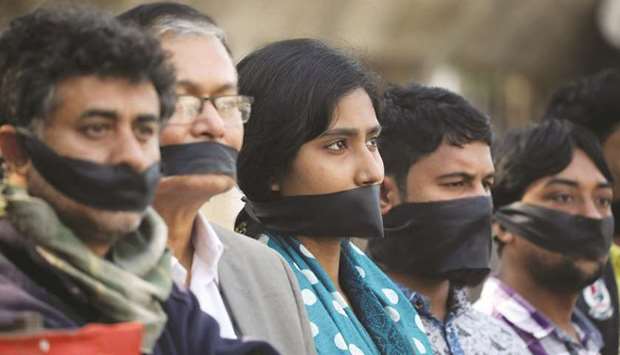Opposition members of Bangladesh’s parliament boycotted a swearing-in ceremony yesterday, after rejecting results of a general election that they said was rigged to give Prime Minister Sheikh Hasina her third straight term.
Hasina’s ruling alliance won more than 90% of the seats contested in Sunday’s election, which was marred by accusations of ballot stuffing, voter intimidation and violence that killed at least 17 people. Hasina and her ruling Awami League party have dismissed the accusations. While newly elected members of parliament from the ruling bloc, including Hasina, were sworn in, the seven opposition members stayed away.
“Why should we take the oath when we’ve rejected this election?” Mirza Fakhrul Islam, secretary general of the main opposition Bangladesh Nationalist Party (BNP), told reporters. Islam is one of the seven opposition members who won a seat. Hasina has denied any election impropriety, calling it a peaceful vote that saw enthusiastic participation. The Election Commission has rejected an opposition call for a new vote, but despite that, the opposition alliance yesterday submitted a new demand for a re-run of the polls. “Our each and every candidate will file a case with the election tribunal in their respective seats rejecting the results and bringing allegations of vote fraud,” Islam said. The BNP, which boycotted the previous election, in 2014, has been hobbled by the absence of its leader, former Prime Minister Khaleda Zia, 74, who was jailed in February on corruption charges her party says were politically motivated.
The party has asked the government for permission to meet Khaleda. Western governments, including the United States and the European Union, have condemned the election-day violence and called for investigation of a range of irregularities.
Yesterday, New York-based Human Rights Watch said the run-up to the vote was characterised by “violence and intimidation against the opposition ... and the misuse of laws to limit free speech”. It called for an independent and impartial investigation of the accusations of electoral abuses. “Reports of ballot stuffing, intimidation of voters, and ruling party control of voting locations on election day mean that an independent and impartial commission should be formed to determine the extent of the violations,” Brad Adams, Asia director at the rights group, said in a statement.
Hasina, whose father, state founder Mujibur Rahman, was assassinated in a coup in 1975, has alternated in and out of power for nearly three decades with her main rival, Khaleda.
Khaleda was first lady when her husband, Ziaur Rahman, was president from 1977 until he was assassinated in 1981.
International / Sri Lanka/Bangladesh/Nepal
Bangla opposition boycotts oath, calls for fresh election

Protesters cover their mouth with black cloths as they join in a rally to demand a new election under caretaker government, in Dhaka, Bangladesh.
